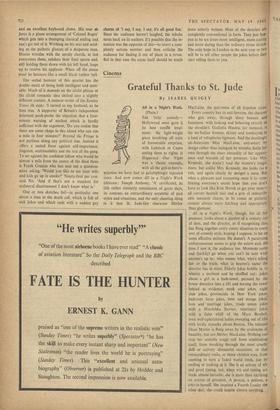Theatre
The Razor Quartet
By BAMBER GASCOIGNE Jonathan Miller is the zombie of the party and his gangle is his fortune Forget Evolution, think of Man as having been developed along industrial lines with each new model slightly smoother than the last, and Jonathan Miller be- comes a very convincing early Mark. On the Puffing Billy one can see clearly what each part is for; funnel, piston, boiler, lanternâit's just the composite whole which seems so improbable. The same is true of Jonathan Miller. His arms are unmistakably arms. His legs are legs by any standards His hands have at least ten fingers between them and his head, could, presumably, be measured for a hat. The confusion arises as soon as their owner starts to deploy these objects. From the first movement it becomes clear that each limb regards itself as the star turn of the ensemble. The result is his famous gangle. But an early model can be a good medium for show- ing up what lies behind the familiar streamlined product, and the best part of Miller's comedy comes from his taking normal human movements and 'reproducing them with the mechanical exaggeration of a prototype. In an earnest philo- sophical argument with Alan Bennett he sud- denly jumps a foot in the air when a good point hits him, and later lies down on the ground to digest an analogy. Watching him is like seeing one of those mechanical arms, which scientists use for handling radioactive objects, pick up a cup of tea and a chocolate Ă©clair. In his mono- logues, on which his reputation was originally based, Miller becomes a more. farouche Paul Jennings, following the absurd wherever it may lead. Too often it leads nowhere and they are, by now, the weakest part of his repertoire.
Alan Bennett is the precise opposite of Miller. With flawless technique he submerges himself completely in the objects of his satire. The bril- liance of his vicar is that he is more like every vicar than any single vicar could ever be, easing his well-oiled voice through false analogies, phoney scholarship, symbolic little anecdotes and the blandest non sequiturs, until his text ('My brother Esau is an hairy man, but I am a smooth man') becomes a purely descriptive statement. Both in the writing and in the performance this sermon is a miniature masterpiece of naturalistic observation.
Peter Cook comes between these two. His TV Prime Minister, mistiming all his gestures and
waving his hand towards a globe whenever he mentions a foreign country, is a brilliantly cruel piece of satire; and his down-and-out who would
have become a judge if he'd had the necessary Latin takes us on another of those delightful Cook's Tours (made familiar by his sketches in Pieces of Eight) through the scrapheaps of fantasy.
Dudley Moore is the music man of the motley
and an excellent keyboard clown. His tour de force is a piano arrangement of 'Colonel Bogey' which gets into a thumping classical ending and can't get out of it. Writhing on his seat and send- ing us the pathetic glances of a desperate man, Moore wrestles with the unruly chords, at last overcomes them, subdues their final spasm and, still holding them down with his left hand, leaps up to receive his applause. When off the piano stool he bounces like a small black rubber ball.
The verbal humour of this quartet has the double merit of being both intelligent and quot- able. Much of it depends on the cliché phrase or the cliché romantic idea shifted into a slightly different context. A memoir-writer of the Sunday Times ilk says: 'I turned to my husband, as he then was.' A supporter of Britain's independent deterrent pooh-poohs the objection that a four- minute warning of nuclear attack is hardly sufficient with the argument, 'Do you realise that there are some chaps in this island who can run a mile in four minutes?' Beyond the Fringe is not partisan along any political line. Instead it offers a united front against self-importance, jingoism, sentimentality and the rest of the gang. To set against the confident fellow who would be almost a mile from the centre of the blast there is Frank Cousins who has sent out a question- naire asking, 'Would you like to see your wife and kids go up in smoke?' Ninety-four per cent. said No. 'And if that's not a mandate for unilateral disarmament I don't know what is.'
One or two sketches failâin particular one about a man in the death cell, which is full of sick jokes and which ends with a sudden gay
chorus of 'I say, I say, I say, it's all good fun.' Since the audience haven't laughed, the rebuke turns back on its authors. It's possible that the in- tention was the opposite of thisâto insert a com- pletely serious number and then criticise the audience for finding it out of place in a revue. But in that case the scene itself should be much
more soberly written. Most of the sketches are completely conventional in form. They just hap pen to be ten times more intelligent, more cutting and more daring than the ordinary revue sketch. The only hope in London in the next year or two will be to tell other people the jokes before they start telling them to you.







































 Previous page
Previous page